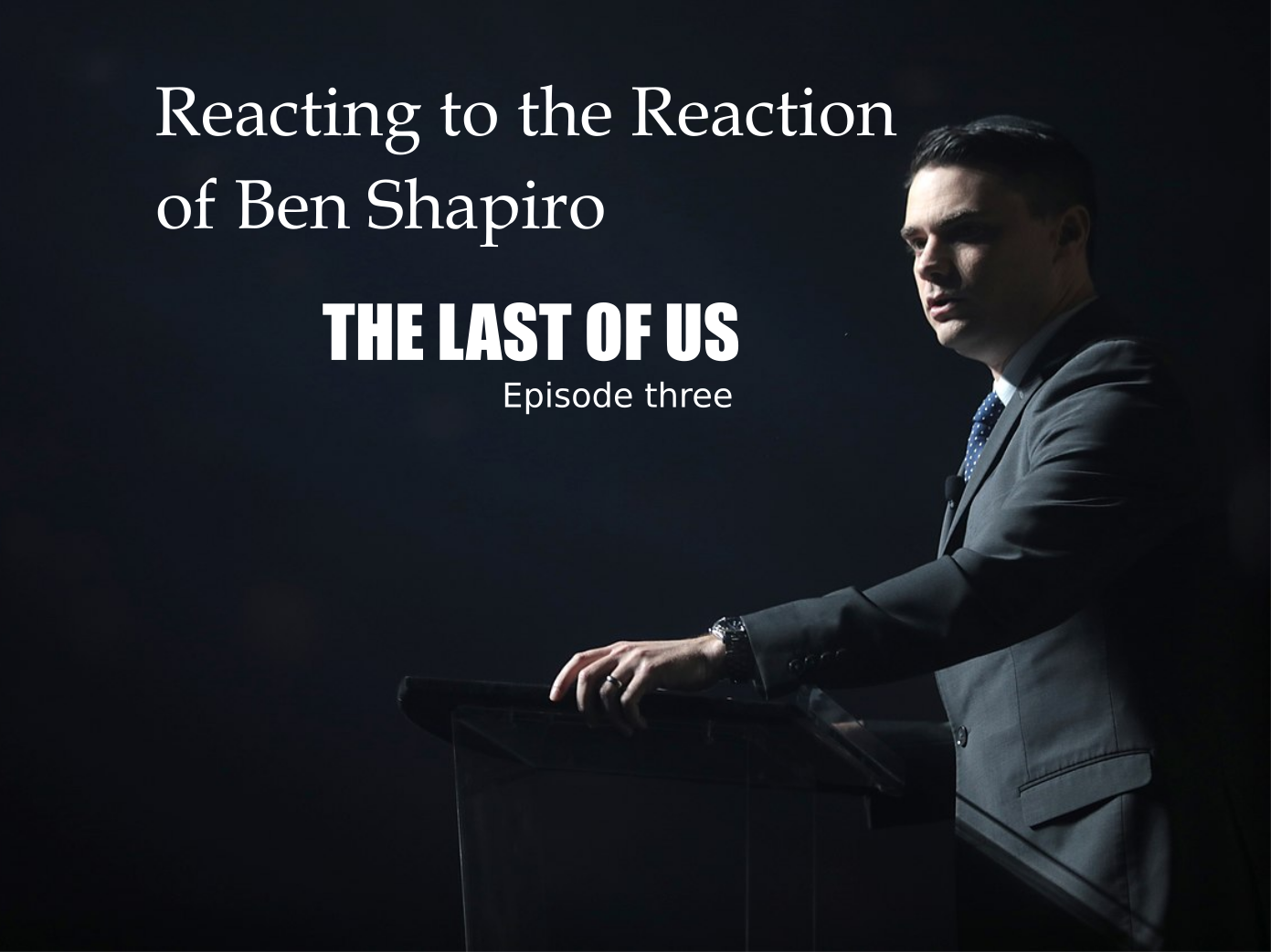As I was saying, The Last of Us, episode three, has garnered mounds of ire and frustration. Purists have trumpeted their disapproval for how the episode deviated from the game, while others have raised cries of alarm over the evident wokeism.
As for representatives of the second camp, Ben Shapiro leads the charge. At the time of my writing this, over half a million people have clicked on his review. You can find it here. In terms of my own sensibilities, he and I tend to harbor similar movie tastes, and because of that, along with his sharp wit and sense of humor, I try to keep tabs on him.
Granting this happy commendation, I must say that I was left wanting more in this instance.
Let me be clear. It isn’t as if his critique of episode three is bad. He raises a number of fair points. The problem is that it doesn’t cut deeply enough. Instead of blasting the zombie in the head with a shotgun, he tries lopping off an arm, which leaves the chompers to latch on to your face.
One of his chief concerns centers on the fact that two gay men cannot have babies. In an apocalyptic scenario threatening the extinction of humanity, preserving the human race through reproduction becomes paramount, or so goes the argument.
This is all fine and dandy, I suppose, but the question that begs to be answered is: Why? Why should two gay men concern themselves with something they can’t effect, and why should someone be concerned with anything outside the matrix of their own localized interests and desires?
It’s an intrinsically weak argument when framed narrowly, and squadrons of people found the cracks in it. Here’s a small sampling from the YouTube comments:
- “Zombies may be the hook, but it’s really about a broken man who shut himself off, and then opened himself again despite the apocalyptic world.”
- “Bill could have survived on his own indefinitely but he chose not to, because life without love and connection is life without meaning. That’s literally the whole point of the show… it’s not just a fungus apocalypse with guns and explosions.”
- “The story is about how humans can continue being humans by finding love even in the most awful circumstances.”
- “Bill knew how to survive; Frank taught him how to live.”
- “It does advance the plot, Ben. It’s an allegory for Joel’s relationship to Ellie. That Ellie/Frank is able to show Joel/Bill the beauty of the world. I thought it was pretty obvious, but some of us I guess let our prejudice blind us with unwavering preconceived notions.”
These rebuttals have teeth if worldview issues are divorced from the conversation. We should take heed and learn. An unwillingness to set apart Christ as Lord profoundly hampers our ability to argue convincingly. We have to unsheathe our theological sword. Naturally, Shapiro doesn’t recognize Jesus as the Messiah, but as an orthodox Jew, he should recognize that the Word of God is indispensable to such conversations. The “Why?” questions ultimately trace back to what is true. If we want to make an argument for having babies, then open up the book of Genesis; and if we want to talk about the God-ordained boundaries of sexuality, keep flipping the pages forward.
If the YouTube comment section of Shapiro’s video teaches us anything, it is that disagreement is going to come, loudly and persistently, and so you can either lay your cards on the table and argue from first principles, which will provide a much stronger attack, or you can cite things such as statistics or societal norms, or offer up nebulous ideals that will be easily swatted away by the strong hand of autonomy.
Stated simply, if the God of Scripture is the Living God, the very fabric of morality and teleology glows with infinite relevance. If He does not, then the substructure of morality and teleology moves in a wildly different direction. Our assessment of episode three, therefore, hinges entirely upon what is true about reality.
So, yes, Mr. Shapiro, having babies is a good thing, but unless that argument is openly rooted in an overarching paradigm that drills down into the bedrock of absolute truth, our tires are going to continually spin in the mud of mere human preference.
[Image: Gage Skidmore, Wikicommons]















Your conclusion should be framed as a reminder, and recalled often in the contexts of other examples of weak apologetics and ethics: “…unless that argument is openly rooted in an overarching paradigm that drills down into the bedrock of absolute truth, our tires are going to continually spin in the mud of mere human preference.”